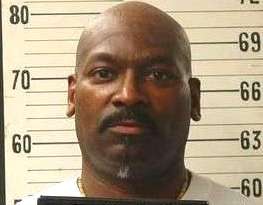Cecil Johnson was executed by the State of Tennessee for a triple murder
According to court documents Cecil Johnson would enter a grocery store to rob it. His first victim was a twelve year old boy working the cash register. Johnson would shoot and injure two others inside of the store. Cecil would leave the store and shoot and kill two men sitting inside of a taxi cab.
Cecil Johnson would be arrested, convicted and sentenced to death
While awaiting his execution Cecil would be one of two inmates who beat to death fellow inmate Laron Williams
Cecil Johnson would be executed on December 2 2009 by lethal injection
Cecil Johnson Photos

Cecil Johnson FAQ
When Was Cecil Johnson Executed
Cecil Johnson was executed on December 2 2009
Cecil Johnson Case
n the end Cecil Johnson Jr., convicted in the fatal shooting of three people – including a 12-year-old boy — in 1981, was only forgiven by his son who is in prison. Johnson, sentenced to death, was pronounced dead at 1:34 a.m. Wednesday after he mouthed “I love you,’’ repeatedly to his family.
In 1980 Johnson shot the 12-year-old boy in the head and killed two other people after robbing a convenience store on 12th Avenue South in Nashville. The family of the victims declined to say anything publicly following the execution.
Johnson’s brother David Johnson spoke to the media, saying, “He’s in a better place because he gave his life to the Lord.” During the execution a daughter, DeAngela Johnson, was described as turning her back and covering her ears against her father’s breathing sounds as the injections began.
Johnson, 53, was forgiven by his 29-year-old son serving prison time in West Tennessee. James Johnson, serving 23 years for aggravated assault and aggravated robbery, sent his father a message with Riverbend Maximum Security Prison warden Ricky Bell. “Tell him I love him and forgive him for not being there,’’ Johnson’s son said in the message. “And tell him he is not the reason why I am in prison.”
Johnson, the sixth person in the state to be executed since 1960, was pronounced dead after a lethal injection was given at 1 a.m. Wednesday morning.
Johnson, then 24, was convicted of three counts of first-degree murder for the deaths of Bobby Bell Jr., James Moore and Charles House. While in prison in 1985, Johnson and an inmate were involved in a fight that led to the death of another inmate. Johnson was charged with voluntary manslaughter.
Still, last ditch efforts for clemency and motions to stop the execution failed. Tuesday night the Tennessee Supreme Court had denied a request for a stay of execution that was filed by the Reconciliation Ministries.
Johnson refused a final meal, said Dorinda Carter, spokeswoman for the Tennessee Department of Correction. He met with his spiritual adviser, Rev. James Thomas, of the Jefferson Street Missionary Baptist Church. Meanwhile, a service was held in opposition to the death penalty at Hobson United Methodist Church in East Nashville, where 60 people gathered.
Suzanne Craig Robertson had visited with Johnson for 17 years, including his last day on Tuesday. She choked back tears, telling the audience that he was fine and hopeful. “He really believes something is going to stop this,’’ she said from the podium. She declined an interview but Robertson has written about her visits with Johnson in the Tennessee Bar Journal, where she’s the editor. The Journal is the monthly publication for the Tennessee Bar Association.
Robertson wrote that “Cecil is very much like many others on death row: he had an abusive, impoverished childhood, he is black, was largely uneducated until he got in prison, and he is indigent. He is nothing like the others to me, though, because I know his face and his laugh. And his daughter. You’d be surprised how that makes a difference.”
Johnson was born August 29, 1956, in Maury County. He had dropped out in the ninth grade before getting his GED in prison in 1987. He was the oldest of 10 children. At 21, Johnson was married and had a child. He worked at Vanderbilt University as dishwasher and cook at the time of his arrest.
What could’ve made a difference in Johnson’s case are some questions surrounding his conviction, said Denver Schimming, an organizer for Tennesseans for the Alternative to the Death Penalty, formerly known as Tennessee Coalition to Abolish State Killing.
Questions were raised after the trial concluded about police reports that were never turned over to Johnson’s attorneys that cast doubt on some eyewitness testimony. His attorneys questioned whether a prosecutor coerced Johnson’s friend into lying about that night. “I can’t speak on Johnson’s guilt or innocence,” Schimming said as he prepared protest signs. “But the process of convicting him was fraught with problems. There was no weapon found, no physical evidence and no proceeds of the robbery found.
“There has to be an alternate method to executions – life without parole,” he added. Many states are reviewing their death penalty laws with some repealing it and others enacting stricter guidelines, said Stacy Rector, director of Tennesseans for the Alternative to the Death Penalty. “Change may come slowly for us,” she said at the church service. But there is reason for hope.”
Before his death, Nashville’s federal court granted a temporary restraining order stopping Johnson’s autopsy, pending further review by the court. A hearing was set for 1 p.m. Thursday, Dec. 10. Johnson claimed an autopsy after the execution would be against his religious beliefs and “would amount to desecration.”
http://www.tennessean.com/article/D4/20091202/NEWS01/91202008/Tennessee+executes+Cecil+Johnson







